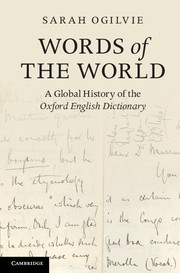Book contents
- Frontmatter
- Contents
- List of illustrations
- List of appendix figures
- Miscellaneous Frontmatter
- Preface
- Acknowledgements
- 1 Entering the OED
- 2 A global dictionary from the beginning
- 3 James Murray and Words of the World
- 4 James Murray and the Stanford Dictionary controversy
- 5 William Craigie, Charles Onions, and the mysterious case of the vanishing tramlines
- 6 Robert Burchfield and words of the world in the OED Supplements
- 7 Conclusion
- Bibliography
- Index
- Plate Section
2 - A global dictionary from the beginning
Published online by Cambridge University Press: 05 November 2012
- Frontmatter
- Contents
- List of illustrations
- List of appendix figures
- Miscellaneous Frontmatter
- Preface
- Acknowledgements
- 1 Entering the OED
- 2 A global dictionary from the beginning
- 3 James Murray and Words of the World
- 4 James Murray and the Stanford Dictionary controversy
- 5 William Craigie, Charles Onions, and the mysterious case of the vanishing tramlines
- 6 Robert Burchfield and words of the world in the OED Supplements
- 7 Conclusion
- Bibliography
- Index
- Plate Section
Summary
Fling our doors wide! All, all, not one, but all, must enter.
Frederick Furnivall (1862), Editor of the dictionary from 1861 to 1879The first edition (OED1) was officially proposed in 1857, and completed seventy-one years later in 1928. A first Supplement volume was published in 1933, and a second Supplement was published in four volumes in 1972 (A–G), 1976 (H–N), 1982 (O–Scz), and 1986 (Se–Z). The second Supplement was combined with 5000 extra entries in 1989 to form OED2. In 1993 and 1997, three volumes of Additions to the Second Edition were published. Work began on OED3 in 1993 – the first complete revision of the first edition and the Supplement volumes – and OED Online was launched in 2000, which allowed users to search either second edition entries or revised third edition entries, as they were published quarterly.
The original idea for the dictionary came in the middle of the nineteenth century from three members of the Philological Society – the oldest learned society in Britain devoted to the study of language. More than a century later I joined it myself, soon after starting at the OED. Once a month I travelled to London by train for its meetings at the School of Oriental and African Studies (SOAS) in Russell Square. The meetings were like something out of another century: they began with tea and sandwiches, and an announcement of the people who had expressed the wish to join since the previous meeting. The members who were present – most of whom were elderly men in tweed jackets – were urged to speak up if they objected. Tea was always excruciating for me because no matter what the topic of conversation I found that the elderly men never looked at me. I remember one conversation about early Maori dictionaries, a personal interest of mine, in which the old man addressed his entire conversation to my young male friend who was a specialist in Old Icelandic and knew absolutely nothing about the topic. Tea was always followed by a lecture on any topic pertaining to historical and comparative linguistics.
- Type
- Chapter
- Information
- Words of the WorldA Global History of the Oxford English Dictionary, pp. 24 - 52Publisher: Cambridge University PressPrint publication year: 2012



